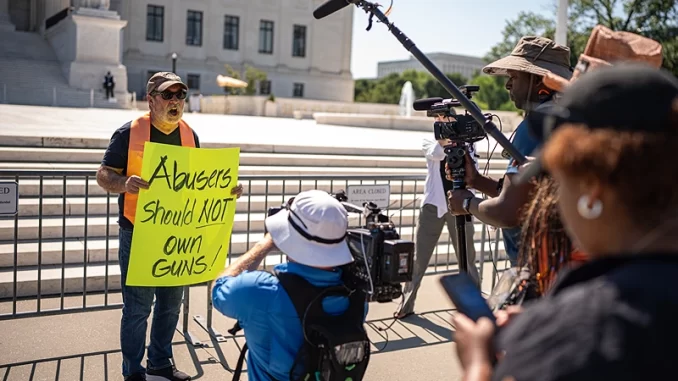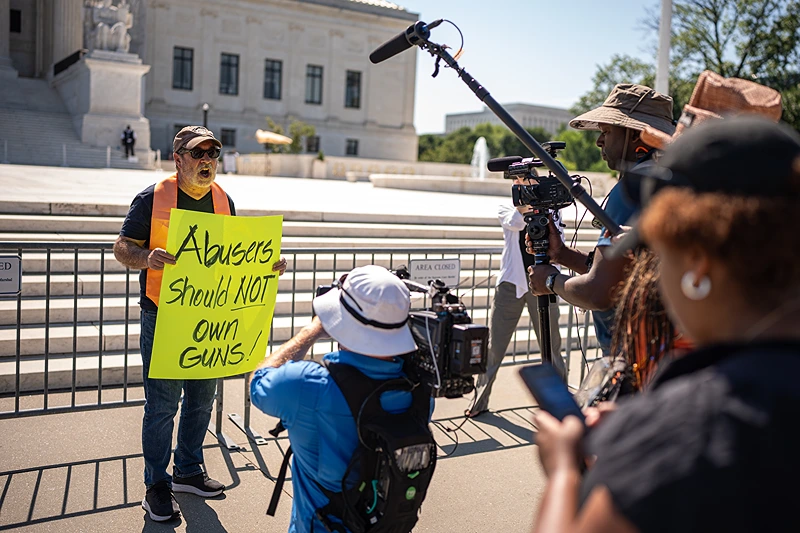

OAN’s Brooke Mallory
12:37 PM – Friday, June 21, 2024
The U.S. Supreme Court upheld a federal statute on Friday that forbids those subject to domestic violence restraining orders from possessing firearms.
Advertisement
By an 8-1 majority, the court upheld the Biden administration’s defense of the statute, which is one of several federal gun control measures that are currently being challenged in court.
The decision suggests that some long-standing gun prohibitions are likely to remain in place despite the court’s 2022 verdict, which increased gun rights by concluding, for the first time, that the Second Amendment of the Constitution grants the right to bear arms outside the home.
Chief Justice John Roberts wrote a majority opinion stating that from the country’s founding, “our nation’s firearm laws have included provisions preventing individuals who threaten physical harm to others from misusing firearms.”
In the matter at hand, the relevant clause “fits comfortably within this tradition,” he continued.
Some of the defenses of the statute put forth by the Biden administration were also rejected by the court in its ruling, such as the claim that the government has the right to disarm those who are not deemed “responsible.”
Zackey Rahimi, a man in Texas, was the subject of a lawsuit before the justices. In February 2020, his girlfriend secured a restraining order against him. He claimed that, in light of the Supreme Court’s ruling, he cannot be charged under the federal gun possession law. Matthew Wright, Rahimi’s attorney, opted not to comment.
Gun Owners of America senior vice president Erich Pratt stated that although Rahimi is a “dangerous individual,” the decision could “disarm others who have never actually committed any domestic violence.”
The verdict on Friday revealed differences among the justices over gun rights, despite the lopsided vote in which only conservative Justice Clarence Thomas dissented. Five justices wrote separate concurring opinions outlining their respective positions.
These lengthy opinions will influence the court’s future decisions in gun cases, many of which are still pending.
Rahimi’s ex-partner, with whom he had a child, was granted a restraining order in 2019 following an altercation in a parking lot in Arlington, Texas. Prosecutors claimed in court documents that Rahimi violently forced the woman to the ground, dragged her to his car, and shoved her inside, causing her to bang her head on the dashboard. Additionally, he is accused of attempting to shoot a nearby witness with his firearm.
Rahimi was also purportedly involved in several other shootings, even while the protection order was in effect. Prosecutors claim that in one of these incidents, Rahimi used an AR-15 to blast rounds into a home.
“Rahimi faces state charges in the domestic assault and a separate assault against a different woman. But the case before the justices concerns his separate prosecution by the Justice Department for violating the federal gun possession law. Rahimi ultimately pleaded guilty and was sentenced to six years in prison,” NBC News reported.
The statute “fails to pass constitutional muster,” according to the 5th U.S. Circuit Court of Appeals in New Orleans, which applied the Supreme Court’s 2022 decision in Rahimi’s case and came to that conclusion last year.
Stay informed! Receive breaking news blasts directly to your inbox for free. Subscribe here. https://www.oann.com/alerts

